Israeli Scene
In Israel, a Village for People With Disabilities
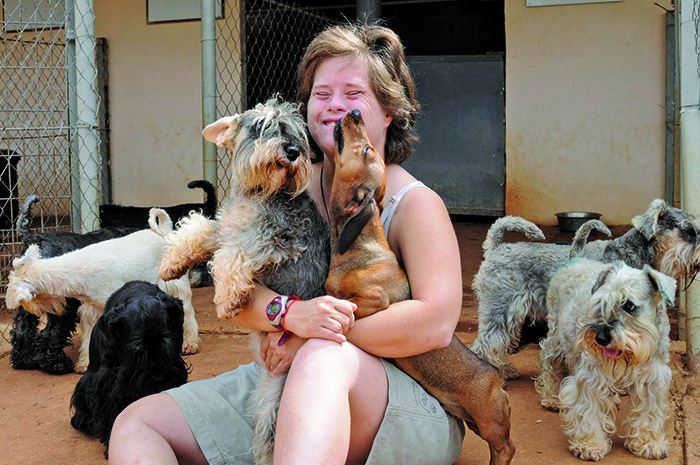
Perched on a hilltop 1,000 feet above the Jezreel Valley in northern Israel, Kfar Tikva “is the Garden of Eden,” declares resident Dadi Ashkenazi. The 45-year-old, who is on the autism spectrum and has a mental health disorder, is taking a break from working on the clay mezuzot and pomegranates he creates at the village’s ceramics workshop. Ashkenazi lives in one of the dozens of stucco and red-tiled-roof cottages that dot the kibbutz-style community for adults with mild to moderate cognitive, social and developmental disabilities. He has lived here half his life, ever since he and his family, with advice from a social worker, decided that the village would provide a fine home for him.
“There are good people here,” he adds, before turning to his ceramics to smooth out a rough edge. His pieces, after they are painted and fired, will be sold in the village’s gift shop. Kfar Tikva not only gave Ashkenazi a community and work as a ceramicist, it has also helped him, with its on-site therapists and physicians, manage his mental health issues, which can spiral into severe depression and even violence.
Ashkenazi is one of 230 residents of the lush, verdant village. Colorful flowers and trees—many cared for by residents—line shaded paths that meander between the cottages and the large dining room, offices, clinic and workshops. Wooden benches overlook tranquil vistas. Handmade mosaics from the ceramic workshop decorate walls and walkways.
The green, hilly landscape of Kfar Tikva provides a stark visual contrast to the 25 acres of flat stony desert that make up ALEH-Negev-Nahalat-Eran’s sprawling residential and rehabilitation village in the south of Israel. Large, white air-conditioned buildings provide refuge from the unrelenting Negev sun, their corridors broad and their rooms bright and cheerful. The planned community, known as ALEH-Negev, is a home for people with severe and complex disabilities. More than half of its 145 full-time residents are children, and many are nonverbal and require almost constant care. ALEH-Negev offers classrooms, an accessible outdoor amphitheater, multiple therapy spaces and a hospital and dental clinic, all designed to serve its residents as well as the thousands who travel there each day to utilize the facilities.
Despite the two communities’ visual differences, and the distinct needs of the individuals they serve, Kfar Tikva and ALEH-Negev, along with Kishorit in the Western Galilee, have something in common: All build on an Israeli communal ethos and entrepreneurial spirit to provide a permanent home for Israelis with disabilities. Kfar Tikva and Kishorit both use the model of the kibbutz, while ALEH-Negev, the youngest of these initiatives, is focused in part on boosting the country’s underdeveloped southern region by providing needed medical facilities.
Some 1.4 million israelis—an eighth of the population—have a disability, defined as any physical, emotional or cognitive impairment, whether permanent or temporary, that substantially limits functioning within one or more spheres of life, according to the Israel Commission for Equal Rights of Persons with Disabilities.
Most with mild to moderate disabilities live with their families, in group homes or in supervised apartments with support provided by the government. Public schools integrate extra classroom instruction and therapy. Several Youth Aliyah villages offer programs: Hadassah-Neurim near Netanya, for example, provides therapy and courses for at-risk kids with learning disabilities. Universities, too, are increasingly inclusive. Programs for students on the autism spectrum at Ariel University and for the blind at Hebrew University of Jerusalem are just two examples.
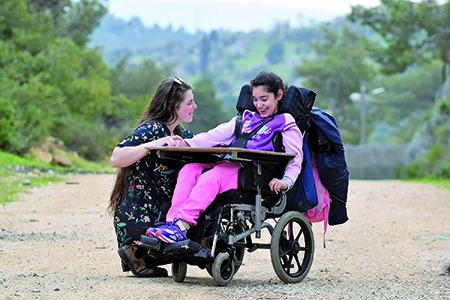
Even the Israel Defense Forces, with programs like Special in Uniform, has, since 2008, inducted 398 youngsters with Down syndrome, cerebral palsy and other disorders, in a move to better integrate people with disabilities into Israeli society.
“In Israel’s early years, disability was considered shameful and kept hidden,” says Elie Klein, North America director of development for ALEH, the umbrella organization for ALEH-Negev. “How many people know that Golda Meir had a daughter with Down syndrome? But today, Israel is a startup nation socially as well as technologically. There is profound understanding here of the need and importance of inclusion on all levels.”
Despite the popularity of villages like Kfar Tikva and Kishorit, which have waiting lists for admission, and ALEH-Negev, currently planning a significant expansion, they are nevertheless part of an ongoing discussion about inclusion and care in Israel and across the world. Parents and specialists in Israel debate what type of programs best provide “an appropriate response to special needs in such a manner as to enable life to be lived with maximal independence,” as mandated by Israel’s 1998 Equal Rights for People with Disabilities Law.
Faige Spolter, 57, who made aliyah 15 years ago from San Diego, has struggled to find a place for her daughter, Atara, 20, who has Angelman syndrome, a rare neurogenetic disorder that requires lifelong care. Atara is simultaneously very active and low functioning. In the United States, she “was in a special class in public school and interacted with mainstreamed kids during lunch, gym and music,” Spolter says. “Israel, however, emphasizes self-contained residential schools for children with severe disability.” Spolter points to studies by the United States’ National Institutes of Health and other sources that found residential care detrimental to the ongoing development of children with disabilities. In the United States, “the move is toward community-based services,” says Spolter, who left her career as a physics teacher to manage her daughter’s care full-time. “We’ve mostly been happy with the daycare frameworks in Israel, but our experience of residential facilities was very negative.”
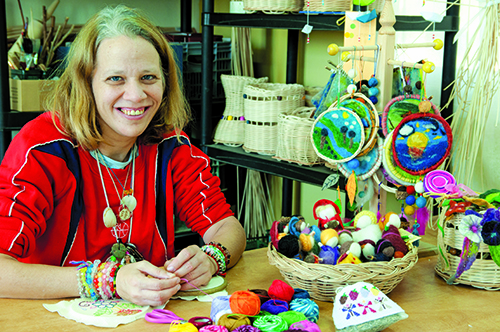
But not every family is able to care for a child with disabilities. And the needs of those with disabilities range as widely as the disabilities themselves. “There’s a great deal of theory about disability,” says Ran Neuman, director of Kfar Tikva’s community living program, “but very little practical knowledge to help people with disabilities live meaningful lives.”
The general trend in the United States and Europe and some parts of Israel “is to de-institutionalize those with disabilities,” explains Neuman, who has a Ph.D. in special education and social work from the University of Haifa. “The thinking is that they’re different not because of their disability, but because of the way the community treats them. The way to solve this, it follows, is to close down the institutions. My take on that? Yes, the stigma is there, but the solution isn’t turning such people with disabilities onto the streets.”
Clearly there is no one-size-fits-all in disability care, says behavioral pediatrician and child development specialist Dr. Zvi Klein, former head of Child Development for Clalit Health Services in Beit Shemesh. He believes the cap on available spots at ALEH-Negev, Kfar Tikva and Kishorit, along with a careful vetting process by physicians and government agencies, largely succeeds in selecting residents whom the framework will benefit. “When I started as a physician decades ago, meeting the needs of disabled adults and children, beyond their daily care, was only a fantasy,” says Dr. Klein. “Today, Israeli compassion and ingenuity have created models that I can only applaud.”
Founded in 1964 on the site of rural Kibbutz Givat Zaid, which had been abandoned four years earlier, Kfar Tikva—Hebrew for Village of Hope—was created by German-born agronomist Siegfried Hirsch, who had been looking for an open community for his stepdaughter, who had developmental delays. Another similar community, Kishorit, home to 170 people, opened in 1997 on the site of former Kibbutz Kishor. Today, Kishorit is known internationally for its breeding kennel, which has produced championship-winning miniature schnauzers and dachshunds. (Another community, Kfar Rafael, near Beersheba in the South of Israel, was founded in 1979. It is not kibbutz-style, and 52 of its 110 residents have physical and mental disabilities.)
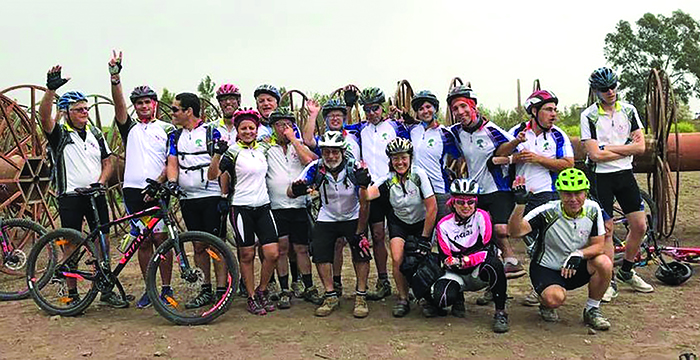
All these residential villages are funded with a combination of government money and private donations. And all have a constant flow of volunteers, both from around Israel and abroad.
Kfar Tikva, though not a kibbutz, retains much of its communal spirit. Residents can vote on planned activities and eat three meals a day together in the busy, light-filled dining room. Its square cottages, each home to two people, date from the original kibbutz.
“It is a home for life, where residents can live with dignity, where the focus is on their abilities, not their disabilities,” says Kfar Tikva’s director, Moshik Gross. The staff of 145 Jews, Muslims, Christians and Druze integrate therapeutic rehabilitation with other services and activities. Programs are designed for each resident, and their daily routine is mapped out, including leisure time and activities.
Each resident has a case manager who helps them figure out a vocation as well as navigate social situations. The case managers check on residents, ensuring that medication is taken and that their homes and personal hygiene are maintained—all while attempting to give them as much freedom as possible.
Shosh Hayim is an artisan making ragdolls, puppets and bags, all for sale at the gift shop. The 41-year-old, who had developmental delays and was in and out of foster care as a child, has lived at Kfar Tikva since she was 19.
Hayim, whose nails are manicured and eyebrows carefully shaped, clearly enjoys her independence. “I had a boyfriend here,” she says with a smile. “We lived together. Then I had enough and told him it was over.”
Revital Levin, who heads human resources at Kfar Tikva, notes that some men and women are best suited to working outside. She points out recent arrival Daniel Moses, a tall and lanky 24-year-old, who works in the organic vegetable gardens. “Others are more sedentary or creative,” Levin says. Tulip Winery, a boutique label, employs a handful of residents, as does the Shraga candle factory, whose Neurim-brand Shabbat candles are sold in stores throughout the United States. Both are privately-owned companies that rent land from the village.
For the most part, the only residents without jobs are those over the age of 60. “People with disabilities tend to age prematurely,” says Gross, the director. “We’ve built an elder center in the heart of the village for them, where they sleep and eat and where others often congregate after work to socialize.”
Kfar Tikva’s leisure options are robust, including swimming, mountain biking, running, tai chi, English and Arabic lessons, drama, music, dance and baking. Some of the youngest, highest-functioning residents join Holocaust-focused high school trips to Poland and, this past summer, a group cruised to Greece. A number are part of a bicycle club with locals from the nearby town of Tivon.
In fact, one in four official Kfar Tikva residents live and work in Tivon. “We have 14 supervised apartments for residents able to live independently, with a safety net,” says Neuman, director of community services. Hayim, the dollmaker, lived in Tivon for a period before returning to Kfar Tikva five years ago.
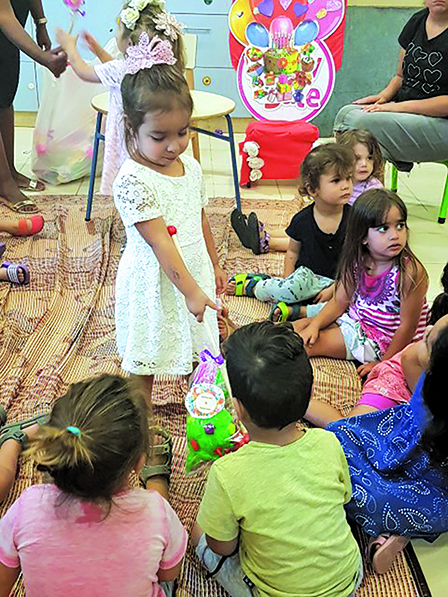
While Kfar Tikva has a warm relationship with the nearby town, it is essentially a self-contained community. ALEH-Negev, however, sees itself as a game-changer for Israel’s South. In addition to residential care, it provides jobs and a medical facility for all, in an area far from the country’s socioeconomic core.
ALEH-Negev, the rehabilitation center and residential village, is the flagship of the larger ALEH organization (an acronym of the Hebrew Azer Layeled Hamiyuchad, Helping the Special Child), the brainchild of paratrooper Maj.-Gen. Doron Almog, former head of Israel’s Southern Command. Almog founded ALEH with several friends in 1982 to provide a secure future for his son Eran, now deceased, who was on the autism spectrum and had severe developmental delays. Today, ALEH serves over 750 children as well as tens of thousands of adults with serious cognitive and physical disabilities at ALEH-Negev and its smaller branches in Jerusalem, Gedera and Bnei Brak.
ALEH-Negev, which opened in 2005 with 10 residents, also provides outpatient treatment to thousands annually, including stroke victims and injured soldiers through its range of therapies—occupational, physical, hydro- and sensory.
In one of the therapy rooms, caregivers are working with five babies and toddlers. Four of the children were taken to ALEH-Negev after being abandoned in the hospital by their families. Many residents rarely see their parents, instead being cared for full time by staff and volunteers.
“This little boy is 3 months old and has a very severe heart condition,” explains Chana Hadad, one of the caregivers. “The child needs constant medical supervision, and it’s more stimulating for him to be here than in a hospital.” The little girl in the next bed, with an outsized head, is 18 months old. She has a shunt in her skull to drain the fluid associated with hydrocephalus. “She needs the tenderest and most rigorous care,” Hadad adds.
A volunteer comes in with a guitar, and the room is filled with music. One child taps along. “Some of these youngsters are reached by music,” says Hadad. “For others, it may be water therapy, animals or colors.”
One of ALEH-Negev’s two kindergartens is inclusive, enrolling 24 local Jewish and Bedouin children together with children with congenital disabilities and developmental delays. Meeting at such a young age, the children easily play together, learning about coexistence and disability.
“Parents initially were reluctant” to have their children in the same class as those with congenital defects and developmental delays, says Klein, ALEH’s North America-based director of development. “Ten years on, there’s a waiting list.”
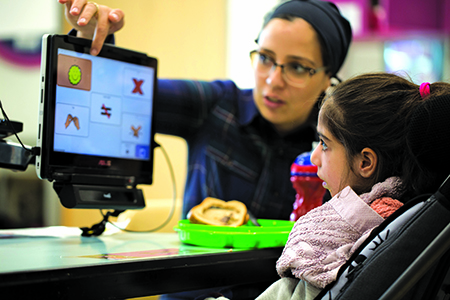
A second kindergarten on the campus teaches toddlers, most of whom live in the village, with more severe disabilities.
Beyond kindergarten, ALEH-Negev’s school provides education for 140 individuals. Their walkers, wheelchairs and leg braces line the corridors. In one classroom, students learn to communicate by pressing or looking at images (a fire for hot, snow for cold, a smiling face for happy) as well as letters and shapes. Outside the school, children play on the village’s swings and roundabouts, which have straps and ample space to accommodate wheelchairs.
Nearby is the multisensory garden, rich with the sounds of running water and wind chimes as well as scents from aromatic plants. Its grounds are tended by 20 gardeners with cognitive disabilities, and its vegetable patch is planted and harvested by residents.
ALEH-Negev is planning a major expansion. A hospital for orthopedic, spinal and neurological rehabilitation is scheduled to open within the year. And in August 2018, building permission was granted for Merhavei Daniel, Israel’s first planned inclusive town. Adjacent to ALEH-Negev’s campus and financed by Israel’s Ministry of Housing and Construction, the western Negev’s Merhavim Regional Council and ALEH, the town will include ramps on every sidewalk and all entrances will be wide enough to accommodate wheelchairs. The 500 housing units, slated to be ready in five years, will feature lower counters and sinks and adjustable furniture.
Back in Kfar Tikva, Michael, 68, moves down the wide, tree-lined path toward the computer center, where he works in the village’s IT department. “Being unwell is sad,” says Michael, who has cerebral palsy and prefers not to share his last name. He has lived at Kfar Tikva for 46 years, since his mother, who raised him by herself, decided that she could no longer manage his care alone. He enjoys the workshops and programs that the village offers. Nevertheless, he says, “if I had magic, I would make us all well, me and everyone here.”
Yet, he acknowledges that he “ended up in a good place with good people. Today, I’m part of the old-timers’ group here. We meet once a week and talk. I have a blog and put my poems on it. I’m free here to be me.”
Wendy Elliman is a British-born science writer who has lived in Israel for more than four decades.










 Facebook
Facebook Instagram
Instagram Twitter
Twitter
H says
Do you have the possibility to hospitalize DMD disabled patients between the ages 22 to 28 ?
SANDRA says
HI DO YOUN HAVE CATALOG WITH GIFTS FOR PURIM
Talia Liben Yarmush says
I’m sorry, we don’t.
Judy Arev says
Hi
Interesting for young adult 30 years old,
Can I have more information how to get him involved?
We live in USA ,
Rina Dorfman says
Hello, I am wondering if this place has a synagogue and is accepting of religious young people. My daughter is 18.
Thank you!!
Nancy Dunn says
We are looking for a community for our high functioning 33-year-old son. We would love some more information.
Ian Shulman says
We are still looking for a community for our 34 year old son who is high functioning. Do you have any suggestions?
Daniella Amsel says
My mum is Israeli and is kept in London locked on a dementia ward when both of us wanted to be together for the rest of our lives. Would it be be possible to relocate to your Kibbutz? We both have physical disabilities but by mum is on a wheel chair and I can help her even though o have a disability as well. It is our joint dream to come to live in Israel. Is there anyway we can come and integrate with you because we are both Israeli my mum being born in Israel , served in the army and was a school teacher and photographer. She has suffered a lot in the uk being without each other and I’ve would as I said very much need to return home.
Deborah Jacobovitz says
Do you have a place for a low functioning austic 26 year old boy?
Please reply
Can I have a contact phone number?